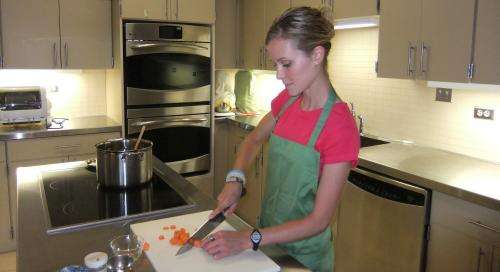Dietitian seeks to reduce obesity among college-age adults

Smart phones and social media may help college-age adults make healthier choices when it comes to food and physical activity, according to Kendra Kattelmann, professor of health sciences and nutrition and director of the dietetics program.
Kattelmann was the lead researcher for Young Adults Eating and Active for Health (YEAH) project, a 15- month study funded through a $1.5 million Agriculture and Food Research Initiative grant from the U.S. Department of Agriculture that involved researchers from 13 other universities.
She is also the state lead on a new five-year, $4.9 million USDA grant called "Get Fruved" that uses social media to encourage consumption of fruits and vegetables. The project is an outgrowth of the work done with YEAH.
Using Web for lessons, encouragement
First, Kattelmann and her colleagues identified key challenges that face 18- to 24-year-olds who are transitioning from living at home to the dorms or off-campus housing and establishing their independence—managing time and dealing with stress from classes, relationships and living circumstances. The researchers then developed a theory-based, Web-delivered program to promote healthy behaviors.
Though the researchers recorded the weight and body mass index, or BMI, of the 1,639 second-semester college freshmen, Kattelmann said the emphasis was on health promotion, rather than weight loss. Two-thirds of the participants were within normal BMI ranges, which mirrors the national college-age population.
Based on the participants' responses, 80 percent met the goal of 150 minutes of moderate physical activity per week before the study began.

In addition, they were encouraged to consume five cups of fruits and vegetables per day and manage stress on most days.
Participants on each campus were divided into intervention and control groups. The intervention groups received lessons on eating, exercise and stress management via the Internet over a 10-week period, according to Kattelmann. In that time frame, email "nudges" along with a short video delivered four times a week reminded the students about their targeted goals and behaviors. These decreased to one per week for the next 10 months after the lessons ended.
Making mindful choices
Results showed that the students had no significant changes in weight, Kattelmann reported, noting the goal was not to lose weight, but to improve eating and exercise habits. The participants "increased their intention to consume healthy foods at mealtimes and for snacks."
Those who received the targeted messages ate 0.2 cups more fruits and vegetables daily. The females in the intervention groups also engaged in slightly more rigorous physical activity than those in the control group.
Preparing healthy meals and staying physically active takes time and does not create economic wealth, but long term may save money in health care costs, she pointed out.
"Developing behaviors for meal preparation, snack preparation and food choices doesn't come easy unless it's a habit," Kattelmann said.
"In a world where we have decreased activities levels due to technology plus easy access to pre-prepared food, young people will have to make mindful choices to prevent obesity-related illnesses."
Targeting fruits and vegetables
The YEAH project then led to the emphasis on fruit and vegetable consumption in "Get Fruved," which began in last fall. The study involves a core of eight institutions, many of whom participated in YEAH, with the University of Tennessee coordinating the project. As the South Dakota lead, Kattelmann and her research team will receive nearly $100,000 per year.
"This project takes into account social context," Kattelmann explained. The researchers will partner with campus organizations, including 4-H, to train peer leaders. They will then be part of a social marketing campaign to promote consumption of fruits and vegetables, along with increased physical activity and stress management.

















